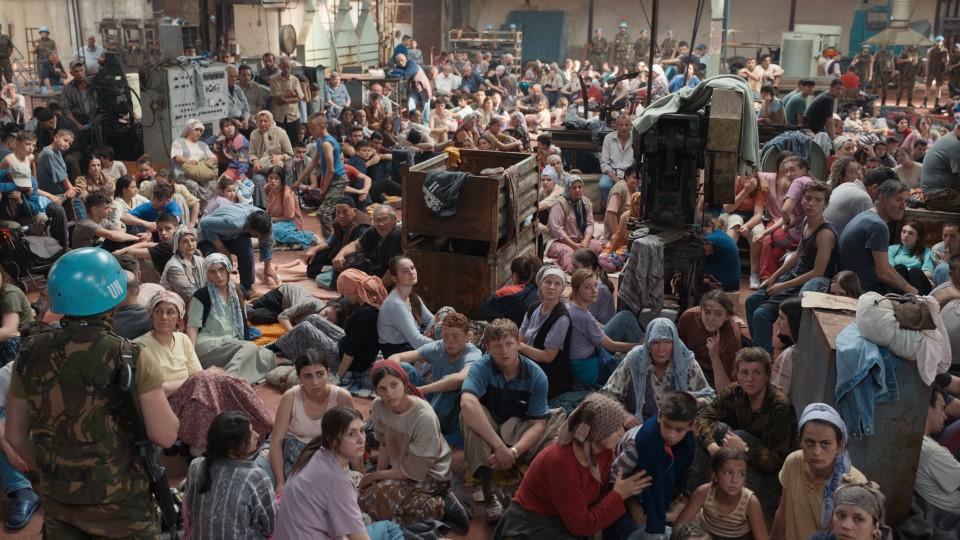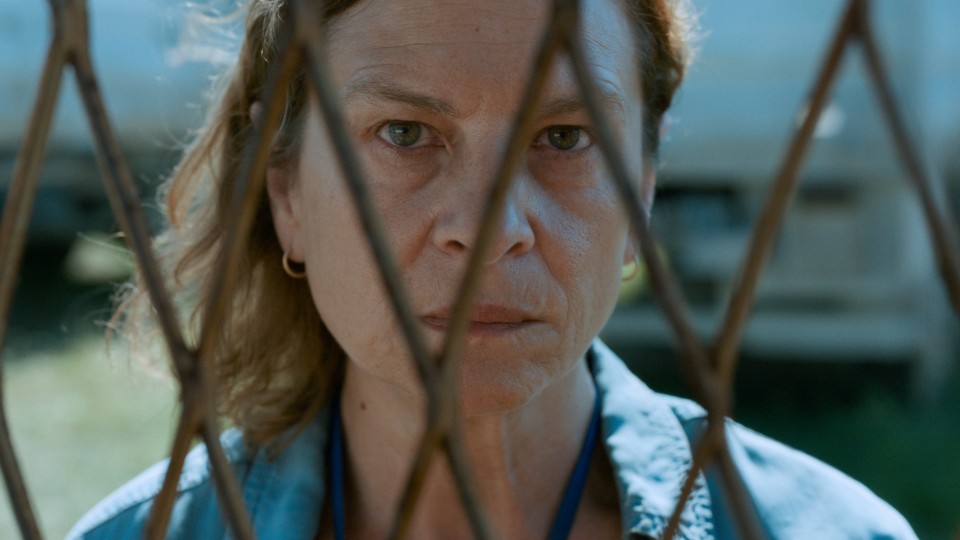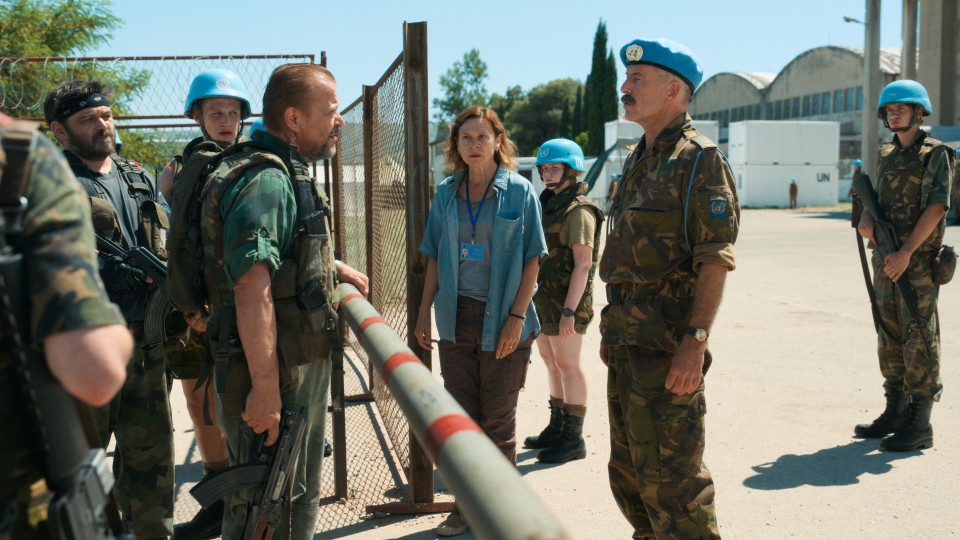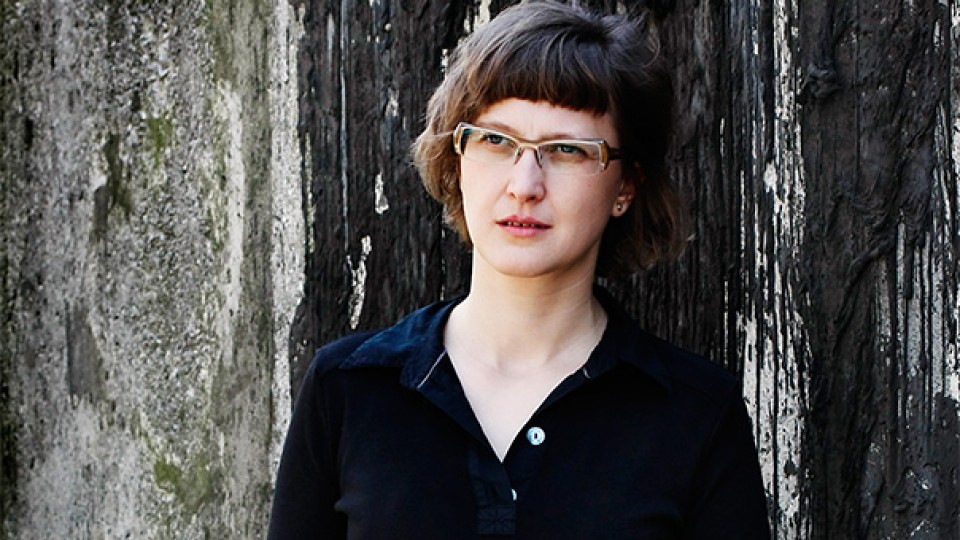Aida is running. Racing desperately, helplessly between the central offices of the Crisis Unit at the UN safe area and the
perimeter fence, which is secured by armed soldiers. As a local interpreter, can she possibly do anything to help the inhabitants
of her home town? Get her own family in saftety? Rescue at least one of her sons? In her film QUO VADIS, AIDA? Jasmila Žbanić has captured the harrowing events of the Srebrenica massacre in 11 July 1995 with compelling immediacy, earning
her an Oscar nomination for Best International Feature and the Independent Spirit Award.
QUO VADIS, AIDA? celebrated its world premiere at Venice 2020, 25 years after the massacre in Srebrenica, an unconceivable tragedy in your
country. When did you think about it as a possible subject for a movie for the first time? What were your feelings when you
started writing the script?
JASMILA ŽBANIĆ: I was following very closely all events about Srebrenica – not only because I’m an artist. Being a Bosnian citizen, I get
confronted with all the information about Srebrenica, about mothers who, in the beginning, had been hoping that their sons
were alive, somewhere in prisons in Serbia. Only years later, when the first mass graves started to be found, did they discover
there was no more hope. I absorbed all this information, and at some point I thought that a film had to be made about it.
Even us, living close to these women, we didn’t know about their horrific journey, their pain. I didn’t feel ready to make
the film myself; it seemed emotionally too heavy, production-wise too big, and I was hoping somebody else would do it. When
I had finished my fourth feature film the time came when, as a directress, I felt ready to carry it off. It meant not only
facing a hard subject; it meant entering a mine field. Srebrenica is denied very heavily by the Serbian authorities that are
still connected with the war criminals. The fact is that a thousand bodies still have not been found, which means there’s
no evidence for the court, and some perpetrators are still free because these bodies have not been discovered. If you shed
light on those events you put them in danger, and you put yourself in danger. I was aware that the Bosnian side also has its
own issues with Srebrenica; there are a lot of mythologies built around it. First of all, I talked to my producer, Damir Ibrahimovic,
who is also my husband, about certain books on what happened on July 11th 1995 and some film footage. Slowly we were getting more dedicated, more serious, realizing that our intentions were about
to become a film. We applied to the MEDIA fund, a very important European fund that allows you to dedicate your time to writing
and research. Once the script was done, we started to talk to coproducers and look for ways to produce it. One of the first
supporters of the project were the Austrian co-producers and funds. That gave us a big push, but it still took us 5 years
to find money to be able to shoot the film.
QUO VADIS, AIDA? is a nine-country co-production. Did you consider, apart from the financial necessity, the importance of
a broad international collaboration in conjunction with the theme of the film, which also questions the role and failure of
the international community, particularly that of the UN?
JASMILA ŽBANIĆ: We wouldn’t have been able to make the film without European co-producers. The first people we contacted were our colleagues
and friends from coop99 filmproduktion in Vienna, because we had made other films together. Our initial plan was to include
the Netherlands, since we needed Dutch actors and their perspective, and we wanted to work with Serbia. We found a producer
there who was willing to participate and applied for Serbian funding, but he was placed under political pressure to pull out
the project. And of course, we didn’t want to cause trouble for the future of this company. We realized that the film would
be much more expensive than our previous ones and that we had to open up to many more co-producers. It’s always better to
have different voices and angles on why somebody wants to make a film. Many European funds liked the script and thought that
the genocide in Srebrenica was an important part of European history. And I think the current situation also influenced the
process. German producers had certainly motivations that were rooted in WW2 and in the rise of the right-wing party in their
government. Austria experienced the Bosnian war at very close quarters. Many Bosnians still live in Austria. I am happy I
live in Europe that has a film funding system and the willingness to support projects on the basis not only of market values
but of their human values.
You’ve told us stories related to the war in Bosnia in your films Grbavica or Na Putu, which focus on individual experiences of violence. Did you feel the need and wish to tackle a collective experience?
JASMILA ŽBANIĆ: In July 1995, 30 000 people were expelled from Srebrenica at the same moment. I knew I had to show the massive dimensions
of genocide. I was worried even during the script-writing process how to balance individual stories and express at the same
time the feeling that this is only one of so many other destinies. While I was writing I thought a lot about these details,
and when I planned the shooting together with the DoP Christine A. Maier we designed the scenes considering how much we could
afford. There were only very few scenes where we felt the need to show the mass of human beings, with a lot of extras of course.
For all the other scenes we had to create a presence of people through certain obstacles, so that thirty people could represent
30,000. We analyzed a lot of films that handle very intelligently the challenge of mass scenes, such as Schindler’s List.
Our sound designer Igor Čamo added several layers of sound so that viewers could feel the masses even though they were not
visible. We used a real footage sound that we found on YouTube, then included the sound of the ocean, because when you see
these masses you have the impression of being in a kind of human ocean, the sound of bees and of course some sounds from the
set.
Even if you didn’t have the budget to constantly show this mass of people, you did an incredible job with the casting. How
did you manage to find all those extras who look so real, who are so touching?
JASMILA ŽBANIĆ: Let me start with the whole casting. We absolutely wanted Jasna Đuričić for the role of Aida and were very happy that she
agreed. We built our structure around her central role. We had actors from Serbia, from Bosnia, Kosovo, Austria, Netherlands,
Belgium etc. When it came to extras, we had to confront the fact that Bosnia only has a very small film industry. Agencies
could offer us a list of 50 extras, but we needed 500. We had to reinvent everything; we invited people who wanted to earn
some extra money who even didn’t know what extras were. We photographed them, and together with my assistant director I chose
every face. We treated the extras like actors. We had a core of 70 extras and gave them storylines with information about
who they were, their family background, their sicknesses, their wishes
They had little stories within our story. Since Srebrenica
is denied and people’s wounds are being opened again and again, our extras felt a certain dignity at the opportunity of being
part of this film. They behaved so positively towards the crew, the actors were very touched by their presence. They were
their acting partners.
You’ve embedded the story of a family in the collective experience around July 11, 1995. Your protagonist is a translator
working for the UN who ends up losing her sons and her husband. A translator plays a very particular role in this situation
of confrontation, being obliged to be the voice of both sides and being in the position to support but also to betray. What
were your thoughts regarding this particular role?
JASMILA ŽBANIĆ: I was inspired by the true and well-known story of a translator who worked at the UN shelter when he was only 18 and who
had to translate the order for his own family: “Now you have to leave the base.” In his book Under the UN Flag Hasan Nuhanovic
documents what was going on from one hour to the next, since he witnessed all the meetings.
I was really inspired by his story, thinking “Can you imagine a worse nightmare than having to translate to your family Now
you have to leave the base?” As if you were the one pushing them out. And of course, I discovered that the role of a translator
enables my main character to attend the meetings, since it was very important to show the UN side and how they took their
decisions. There’s also some YouTube footage of those days, thanks to the propaganda machine of General Mladić, who always
had his cameramen shoot the events. On the other hand, I needed to talk from a Bosnian perspective: Aida stands for the destiny
of all people from Srebrenica around her, but she is also aware that she has the privilege of the UN badge. In the beginning
she is negotiating with the UN soldiers to let more people in, she speaks up for all of them, but the more the situation worsens,
the more her humanity shrinks. She only cares for her family, then she’s ready to give up her husband to save her sons, and
in the end she’s trying to keep at least one son. That’s how I feel about war: There are only very few heroic moments, as
shown so often in films. In reality, war is primarily about losing humanity.
What did it mean for your principal actors Jasna Đuričić and Boris Isaković to slip into the role of Aida and General Mladić?
JASMILA ŽBANIĆ: Jasna immediately accepted the invitation to play this role; she was attracted by the drama of her character. Boris needed
more time to think about it, since he had had many roles in war films, and it wasn’t easy to interpret the role of General
Mladić, who is considered to be a hero in Serbia. Both of them knew that my main actress in Grbavica, the Serbian actress Mirjana Karanović, had to face a lot of problems for having played a Bosnian woman in a film dealing
with the atrocities committed by the Serbian army. They knew they were taking a risk, but they accepted. I find them so brave,
but they say it not out of bravery but out of professionalism and for the artistic quality of the film. As citizens from this
region they wanted to tell this story. It is important for all of us to communicate with each other, since the events that
happened are very often transformed by the media into something that is close to mythology or lies. Talking about Srebrenica
from a human perspective is what we need.
Once again you worked with the Austrian DoP Christine A. Maier. How did you develop your cinematic vocabulary to express the
atmosphere of despair, to express the inconceivable? Did you try to find a female language to express the atrocities of war?
JASMILA ŽBANIĆ: From the very beginning we wanted to keep the camera at a human level. No cranes, no drones. And we wanted to stay as much
as possible with Aida. Sometimes we had to leave her, but whatever happened without her, had consequences for her. Coming
myself from an experience of war, I can’t conceive of any image of war that I find attractive. For both of us, war is about
the banality of evil. We refuse to aestheticize destruction or killing. Our main image of war is the woman shot in her back
while she was cooking lunch and soldiers were stealing stuff from her house. War is about stealing, about unjust and inhuman
gestures. I remember the day we got two tanks for the shooting, which took a very long time since the authorities tried to
block our film in many ways. Eventually we got two tanks two months after the main shooting, for one single day. The interesting
thing was that all the male members of the crew got totally excited about those machines. We women couldn’t believe it. They
called us to take photos, and I could not understand why I would want to take a photo with a killing machine. So naturally
or subconsciously we were choosing images that are not excited by war, but the absolute opposite.
There’s a time cut towards the end of the film. We meet Aida years later going back to her former apartment in Srebrenica
and also finding the remains of her sons after the excavation of the mass graves. Do these scenes account for the title QUO
VADIS, AIDA?, tackling questions such as What does it mean to survive? Is it possible to make peace?
JASMILA ŽBANIĆ: I didn’t want to finish the film with the images of the killings. I’m living here next to these women, and their torture
is going on. This reality is full of horror and terrible things, especially for those who returned to live in Srebrenica.
Not very many did so, because their houses had been destroyed. But some of them wanted to return; they said their memories
were within the walls of their former homes. At least they can see a tree in front of their house where their son used to
play, and they could at least feel him this way. I talked a lot to these women and found them absolutely amazing. They are
coming from this very small town, most of them are not very highly educated, and they have a knowledge and an understanding
of this world that is better and deeper than that of any politician who is running a whole country. They never ask for revenge,
they’re always talking about justice, truth and the fact that we have to live together. They never use a nationalist approach,
saying that all Serbs killed the Bosnians; they are aware that there were also protests against the war in Serbia. These women
have characteristics we associate with saints, with supernatural beings. And we have them right in front of us; they convey
something that belongs to the universe, that is beyond this Earth. I’m not religious, so I’m choosing my words carefully.
The question Where do you go? doesn’t only relate to the epilogue of this film; it concerns Aida from the very beginning.
She’s running all the time, she doesn’t know which is the right direction. At the end there’s the moment of returning to the
place where she used to live with her loved ones: she will be forced to meet the perpetrators and teach their kids every day,
but we also raise the question: Where will this new generation go? Where will this Bosnia go? Will the kids close their eyes
and repeat the mistakes of former generations? Or will they open their eyes and change something? That’s also the question
I ask myself: Where are we all going?
The film had incredible resonance on an international level – 2 nominations at BAFTA, winner of the Independent Spirit Award
and most recently, the Oscar ceremony with a chance to win an Academy Award for Best International Film. How do you account
for this strong response?
JASMILA ŽBANIĆ: When I was about to write the film, I really wanted the people who hadn’t been through this experience to understand emotionally
what a war means. I was very happy about the invitation to the Venice competition and the response of the audience; I was
amazed by the reaction of the critics. People from completely different places in the world gave me the impression they understood
the film and its emotions. As a directress or director you always hope that a lot of people will watch your film and understand
you. Sometimes you manage, sometimes you don’t.
I also think this film was released at the right moment, even though the circumstances of the pandemic are another issue that
caused a problem for the film. But I am talking about something else: If I had made it five years earlier, when most people
lived in a very comfortable situation, maybe people would not have been open enough for this kind of film. I have a theory
that sometimes films are made at the right time and they resonate with people, and sometimes films are discovered later because
they were ahead of their time and didn’t resonate. Due to the pandemic, to Donald Trump, to right-wing governments in Europe,
people have become more receptive to stories about people who had a normal life and were suddenly confronted with an inconceivable
situation. Our institutions that are supposed to guarantee us safety and protection suddenly proved to be unreliable during
the pandemic. The picture of the Europe we thought we were living in was no longer valid. I have a feeling that is why this
film resonates so much with an audience today.
What did it mean to you to receive an Oscar nomination for this film in particular?
JASMILA ŽBANIĆ: When we got the Oscar nomination the interest in the film increased enormously. And, as I said before, it was my dream that
a lot of people would see the film. Bosnians were so enthusiastic about the Oscar nomination. The film is the same before
and after the nomination, but even those who did not want to see it were suddenly interested in it. That is funny, but that’s
how the world works. I was happy that the nomination put such a strong spotlight on the film.
You went to L. A. under very particular circumstances due to the corona pandemic. Tell us a bit about the reception of the
film and the ceremony.
JASMILA ŽBANIĆ: I wish there hadn’t been the pandemic and we would have been able to launch a lot of activities in L. A., such as meetings
with the audience or other directors. That was impossible. They were very careful in terms of safety measures, and we had
to do many tests before we could enter the ceremony. After the ceremony we had some meetings and talks about new projects.
And during the ceremony our opportunites to communicate was very restricted. I met Frances McDormand in the ladies’ room.
I don’t think very many Academy members had watched our film. They are not obliged to see all five films in the international
section, and it’s a fact that the international section is not so important for US professionals. It’s about the US industry,
and you have the feeling you’ve come to somebody’s birthday party, everybody knows each other and you are an outsider. But
it was fun after all this hard work to have that kind of celebration.
Interview: Karin Schiefer
May 2021






